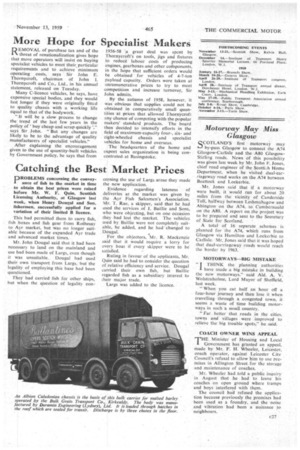Motorway May Miss Glasgow
Page 77

If you've noticed an error in this article please click here to report it so we can fix it.
SCOTLAND'S' first motorway may
by-pass Glasgow to connect the A74 Glasgow-Carlisle and the MO GlasgowStirling roads. News of this possibility was given last week by Mr. John F. Jones, chief road engineer of the Scotti,h Home Department, when he visited dual-carriageway road works on the A74 between Beattock and Lockerbie.
Mr. Jones said that if a motorway were built, it would run for about 20 miles from the vicinity of Canderside Toll, halfway between Leshmahagow and Abington on the A74, to Cumbernauld on the A80. A report on the project was to be prepared and sent to the Secretary of State for Scotland.
A total. of 16 separate schemes is planned for the A74, which runs from Glasgow via Hamilton and Lockerbie to Carlisle. Mr. Jones said that it was hoped that dual-carriageway roads would reach the border by 1%3.
MOTORWAYS—RIG MISTAKE
" ITHINK the planning authorities
have made a big mistake in building the new motorways," said Aid. A. V. Wolstenholme, Lord Mayor of Sheffield, last week.
"When you cut half an hour off a four-hour journey and then lose it when travelling through a congested town, it seems a waste of time building motorways in such a small country.
" Far better that roads in the cities, towns and villages were improved to relieve the big trouble spots," he said.
COACH OWNER WINS APPEAL
THE Minister of Housing and Local Government has granted an appeal, made by Mr. F. H. Wheeler, Leicester, coach operator, against Leicester City Council's refusal to allow him to use premises in Allington Street for the storage and maintenance of coaches. , Mr. Wheeler had told a public inquiry in August that he had to leave his coaches on open ground where tramps and boys interfered with them.
The council had refused the application because previously the premises had been used as a foundry, and the noise and vibration had been a nuisance to neighbours.
































































































































































































































































